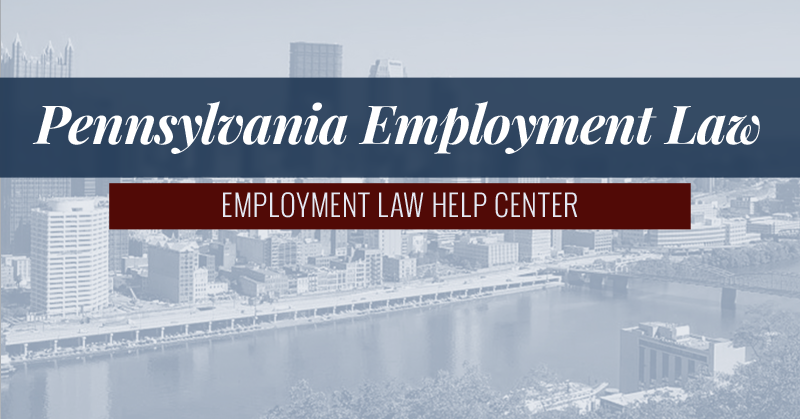Pennsylvania Employment Law
Employment law is an important area of the law that encompasses nearly all aspects of employee/employer relationships, including proper pay, overtime wages, workplace discrimination, sexual harassment, wrongful termination and disability benefits. In addition to federal laws, the state of Pennsylvania has its own laws in place dictating the rights and duties between employees and their employers, protecting employees from unfair treatment in the workplace, and ensuring that all employees have access to the same opportunities, regardless of their color, race, religion, gender, and other characteristics protected by law. If you believe you have been the victim of an employment law violation in Pennsylvania, contact an experienced attorney today to discuss the possibility of filing a claim against your employer.

Wage and Hour Laws
The state of Pennsylvania has strict laws in place that, in conjunction with the federal Fair Labor Standards Act (FLSA), dictate the proper minimum wage, overtime pay, and other conditions of employment covered non-exempt employees are entitled to at work. In Pennsylvania, the minimum wage requirement is $7.25 per hour, which means covered non-exempt employees are entitled to at least that hourly wage, and wage laws in PA also dictate that employees must be paid one-and-one-half-times their regular rate of pay for any hours worked over 40 in a given workweek.
Workplace Discrimination
Title VII of the federal Civil Rights Act of 1964 prohibits employers from making any job decisions based on protected characteristics, which include color, race, sex (including pregnancy), religion, or national origin. There are also Pennsylvania State and federal laws in place that make it unlawful for an employer with at least 15 employees to discriminate against an employee on the basis of genetic information or disability, or, for an employer with at least 20 employees, to discriminate on the basis of age, if the employee is at least 40 years old. Workplace discrimination applies to any part of the employment relationship, including hiring, promotions, firing, pay and benefits, leave, layoffs and discipline.
Sexual Harassment
Under Pennsylvania law, it is illegal to harass an employee on the basis of his or her gender, which is a form of sex discrimination covered by the Civil Rights Act of 1964. Sexual harassment in the workplace refers to any unwanted sexual advances by an employer, co-worker or another person at work, and may include such things as sexual bribery, sexual comments, requests for sexual favors, or sexual coercion. There are two main types of sexual harassment employees may face at work: quid pro quo harassment, in which it is implied that submission to unwanted sexual conduct is a term or condition of employment, and hostile work environment harassment, in which the harassment is so severe it creates an offensive work environment.
Wrongful Termination
Pennsylvania is an at-will state, which means the employee/employer relationship may be terminated at any time, for any reason, or for no reason at all. However, it is against the law for an employer to fire, discipline, or otherwise retaliate against an employee for exercising his or her rights by filing a complaint about workplace discrimination or harassment, reporting unsafe working conditions, or refusing to commit a crime. An employee who is fired for discriminatory reasons in Pennsylvania may have a wrongful termination claim against his or her employer.
SSI and SSDI
Supplemental Security Income (SSI) and Social Security Disability Insurance (SSDI) are federally-funded programs that provide financial assistance in the form of monthly benefits to disabled individuals who are unable to perform normal work duties, and therefore have no reliable income. In order to qualify for SSDI benefits, disabled individuals must have worked for a certain number of years and paid Social Security taxes during that time. SSI benefits, on the other hand, are paid to children and adults 65 and older who meet the definition of “disabled,” and who have limited income and resources.
To learn more about Federal US employment laws, browse the following topics:





